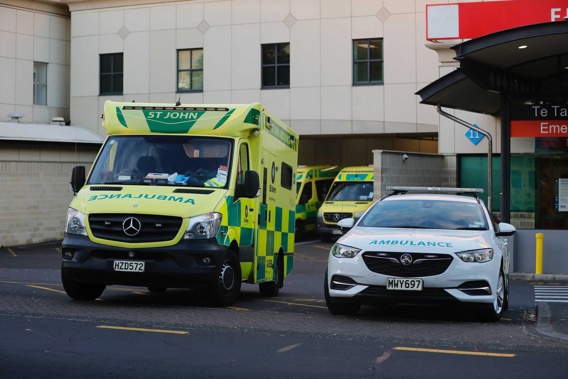
Sick and injured patients are being left in hospital corridors and ambulances are queuing outside Auckland emergency departments as demand continues to skyrocket.
Mothers with high-risk pregnancies have occasionally been transferred out of the Auckland area to give birth, because no beds are available in the region.
Middlemore, Auckland City and North Shore Hospitals sent an alert to ambulances on Monday night warning that they were nearing maximum capacity, the Herald can reveal.
Emergency responders were told to transport patients to "alternative facilities" such as community accident and medical centres or in less severe cases sending a paramedic to treat them at home.
Multiple health experts warned the overload, causing delays and rushed discharges, was putting patients at greater risk.
Spokespeople for Auckland, Waitematā and Counties Manukau district health boards confirmed there had been an increase in admissions - but said even at the busiest of times staff would always ensure anyone presenting to a hospital would get the right care as soon as possible.
'Staff are burned out': Emergency doctor
Meanwhile, one Auckland emergency doctor told the Herald he was worried about the impact the increased demand was having on staff and the flow-on impact it could have for patient care.
"Staff are burned out. Without the resources, including time and staff support, it's difficult to work effectively."
The specialist did not want to be named out of fear of losing his job.
Operating well above maximum capacity was a problem that had escalated this year with the backlog of planned care that had been put on hold because of Covid-19, he said.
Sarah Dalton, executive director at senior doctors union Association of Salaried Medical Specialists (ASMS), said multiple doctors had told her Monday night was super busy, with one from Auckland City Hospital saying there were "lots of patients waiting in corridors for beds to get treatment".
She said when hospitals started to run over 80 per cent capacity it meant:
- Patients were more likely to be discharged earlier than they should, putting their recovery at risk.
- There would be delays for people who need beds for treatment, which could have a negative flow-on effect in terms of their healthcare outcome.
- It also plays havoc with planned care procedures and surgeries because often they will have to be cancelled at late notice - "which mucks people around and becomes really ineffective in terms of cost and could be really devastating for patients".
The Herald last month reported patients waiting up to two hours for an ambulance, with St John confirming the "average" delay in transferring a patient into the care of emergency department personnel was between 30 to 45 minutes.
Stu Cockburn, St John general manager of ambulance operations, said Monday night was a busy evening but it was not out of the ordinary.
"While the need to implement these measures predominantly occurs in winter, our ambulance staff are now experiencing this on a more regular basis, particularly on Mondays."
The emergency doctor said Mondays were particularly bad because patients couldn't be discharged over the weekend and not all hospital services were available in the weekend.
Dr Barry Snow, Auckland DHB director of adult medical, said staff were busy with emergency department presentations and admissions, and with patients who are in hospital for planned appointments and procedures.
"The public can be assured that if they or their loved ones need hospital-based care, we have the capacity to provide a high standard of care.
"We have an operational model that enables us to safely flex our wards at times of peak demand. This includes opening flex beds [physical beds that are not always needed], reviewing rosters to ensure that they are safe and having additional nurses to support our patients and teams."
But although there were more inpatients, those numbers were lower than a typical busy winter.
An Auckland DHB Hospital Advisory Committee (HAC) report, released in April, said it was expected that winter 2021 would be "very challenging" and would require all physical beds to be open to enable urgent and planned care to continue.
David Wills, director of the Nurses Society union representing hundreds of nurses across the country, said occupancy numbers at Auckland's three biggest EDs were at peak levels and it was part of long-standing problem.
"And it's not just EDs. Its ICUs, NICUs, they all had very low bed capacity that hasn't kept up with population growth."
Another report, released by Auckland DHB in March, said its neonatal intensive care unit (NICU) had been "extremely busy" the past two or three months.
"This has resulted in two pregnant mothers needing to be transferred out of the region because the entire region was full."
Dr John Beca, Starship child health director of surgical, said occasionally mothers with high-risk pregnancies were transferred out of Auckland to give birth because there were not enough beds.
"This is something that we only do if it is deemed very necessary."
Occupancy levels and demand was under review and the department was looking at long-term options for managing the forecast demand for NICU cots in the next five to 10 years, Beca said.
"Future solutions may include new models of care, increased clinical staff and in time, and an increased physical footprint."
Hospital's advice to the public
- If you're unsure where you should go for care, call Healthline for free advice from a nurse on 0800 611 116.
- If it's a serious or life-threatening emergency, don't hesitate to call 111 or go to the emergency department.
- If you have an appointment at our hospitals or clinics, please attend the appointment as scheduled.
Take your Radio, Podcasts and Music with you









